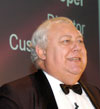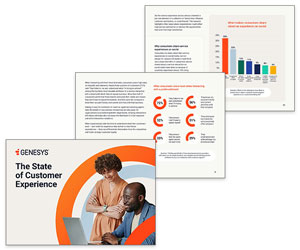Once upon a time, in the long ago past when product was king, the marketeers ruled the earth.
Paul Cooper looks at the changing face of customer service.
When marketing ruled
Of course it was an easy job to promote, and tell the world about, the wonders of such truly world-beating products like Coca Cola, Kelloggs and Mercedes.
The real skills came to the fore when manufacturers brought out real turkeys which had to be turned into swans by the skilled wizards of the marketing department – Allegros, C5s, New Coke – Ah! Those were the days.
But then the face of the earth was introduced to the Total Quality Management Syndrome, and the quality of products started to get better and better, and they all became more similar. Sneaky car manufacturers sent Skodas down the same production line as Audis; the Japanese built better products than the Germans; Italians added style – and they all started to work better, and run for longer and longer, until brand loyalty started to fade into the distance.
World-famous names no longer stood for what they use to build – IBM stopped building computers, Xerox stopped copying things, product names disappeared – Ecco, Wolseley, Omo – Ah! The memories!
But, because things all began to work better, fewer things went wrong.
Product complaints fell and the need to provide better, or any, service grew.
Whereas before, complaints fell on stony ground so we stopped complaining, enlightened organisations started to listen.
The switched-on organisations then realised that if their products were the same as everyone else’s – banks, insurance companies, supermarkets – then the only true differentiators were service and price.
The great divergence
So the great divergence started, and those who saw the real future realised that it was only through service that long-term success was possible, and so they started to give some. And lo, some got very good indeed.
But those that didn’t get it thought, “Ah, we know what we’ll do! Call in the Marketing Department.”
So they did, and it didn’t work.
Customers know when they are getting great service
Because, you see, unlike with many products, customers know when they are getting great service and when they aren’t.
By exercising choice, they are demonstrating it every day.
The Waitrose and Tescos of this world know it; the First Directs, Specsavers and the Prêt a Mangers know it.
But where would you stand if you saw a latest advert from Ryanair – “Now the greatest at customer service too!” – Yes, exactly.
The point is that an organisation has to be great at it first, and then by all means sing it from the rooftops – but not before.
What price for good service?
Firstly, there is a big difference between a customer’s reaction to good/bad price and service. If they find the same product at different places and different prices they will, often, buy it at the cheaper price but hold no long-term grudge against the other place and return to buy other things at a later time. However, if they get bad service the chances are they’ll never go back.
It’s an emotional thing that takes a lot of recovering from.
Further, if an organisation has built a true and genuine relationship with a customer, and gained their loyalty and trust, not only will the customer be an active advocate for the organisation (be part of its marketing team) but the customer will also not be as price sensitive.
Customers are prepared to pay more for good service

Paul Cooper
In fact, research shows that customers are prepared to pay up to 20% more for the product or service concerned, and are prepared to be an advocate for both the product and the organisation.
So, building the proposition by adding value through service will always lead to more satisfied, loyal and happy customers that can at least create the correct environment where keenness of price is a secondary issue.
Practical examples abound in the market – when was the last time Waitrose were the cheapest supermarket, Lexus the cheapest car, Singapore Airlines the cheapest airline, or First Direct, although competitive, but not the cheapest, rates?
The true message is that now it is the customer service professionals, especially those in contact centres, who are the real brand champions, and who have the responsibility for the reputation of the organisation. They shall inherit the earth.
Paul A Cooper is a Director of Customer Plus
Author: Jo Robinson
Published On: 2nd Nov 2011 - Last modified: 23rd Jun 2017
Read more about - Customer Service Strategy, Customer Service, CX, History





















